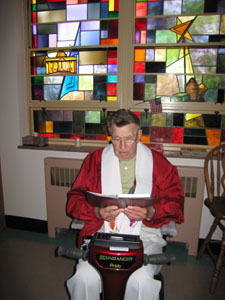By Margie Wuebker
mwuebker@dailystandard.com CARTHAGENA -- The Rev. Arnold Meiring settles into the seat of his motorized scooter and heads for the chapel in the infirmary at St. Charles Center.

Mass remains an important part of life after 65 years in the priesthood. He willingly shares the role of con-celebrant these days with other retirees, many of whom are considerably younger.
"We always had likable priests in Cranberry Prairie where I was born and in Sharpsburg where I grew up," the 90-year-old man recalls. "I considered the life of a priest to be worthwhile, and my ultimate decision came at the age of 12 or 14."
Meiring joined the Missionaries of the Precious Blood in 1928, spending his first two years at the Burkettsville Novitiate, the next four at St. Joseph College in Rensselaer, Ind., and then six at St. Charles Seminary, the same sprawling complex he now calls home.
Following ordination on April 21, 1940, he served parishes in Oklahoma, Kansas, North Dakota, Wisconsin, Louisiana, Kentucky and Ohio. He then ministered at St. Francis Catholic Church in his native Cranberry Prairie and St. Aloysius Catholic Church in Carthagena from 1979 to 1992. "My last assignment before retiring here in 1994 was associate senior pastor at Immaculate Conception Catholic Church in Celina," he says. "I've slowed down some in recent years, but you never stop being a priest."
Meiring does not need time to think when asked about the many changes he witnessed over the years. Priests once celebrated Mass in Latin. Only readings and homilies were in English. People followed along in St. Joseph Missalettes to understand the liturgy.
"Priests faced away from the people about half the time and did everything but take up collection," he says. "Altars face the congregation nowadays and lay people take an active role at Mass from giving readings to distributing communion."
Meiring recalls a time when the term "priest shortage" was nonexistent. Larger congregations in the area often had as many as three pastors in residence.
"Priests began to leave the order in the 1960s and 1970s," he says. "Candidates for annual ordination dropped from 18 and 20 to fewer than five. The seminary here closed because numbers did not warrant bringing in professors. We are beginning to see a slight increase in terms of religious vocations, particularly in the area of college educated men with established careers."
Meiring enjoys reminiscing about the days he spent as a seminarian. St. Charles was a bustling place in those days with more than a hundred students, numerous professors and dozens of nuns who did the cooking, cleaning and laundry.
Students awakened at 6 a.m. in order to dress and be in the main chapel for 6:30 Mass followed by breakfast. Classes commenced at 8 a.m. and continued until 11:45 a.m.
"We headed to the chapel for the Angelus, Scripture readings and private prayer," he says. "We ate lunch at noon and then did chores. I enjoyed working in the large garden where we raised everything from onions to strawberries for the kitchen. It took a lot of food back then, with the milk, eggs and meat coming from the farm."
Classes resumed at 2 in the afternoon with the evening meal served at 6, free time until 7:30 devotions and then studies until bedtime at 10.
Sunday was reserved for morning Mass, afternoon and evening devotions and family visits. Seminarians and staff gathered around radios for Jack Benny and evening talk shows featuring Father Charles Couglin.
Meiring especially enjoyed preparing homilies and giving instructions to people interested in joining the Catholic church. He had his own philosophy when it came to delivering sermons.
"I always looked over heads instead of establishing eye contact," he admits with a chuckle. "There was always one or two in every congregation who would make a face in hopes of interrupting my flow."
Meiring gave up swimming and golfing in recent years, although trophies in his room attest to meritorious performances at the Mercer County Elks Club course and priest golf tournaments in Dayton. He still enjoys daily Mass, light exercise, quiet reflection and visiting with fellow retirees.
"God called me to the priesthood many years ago," he says. "And now I am awaiting his next call." |

